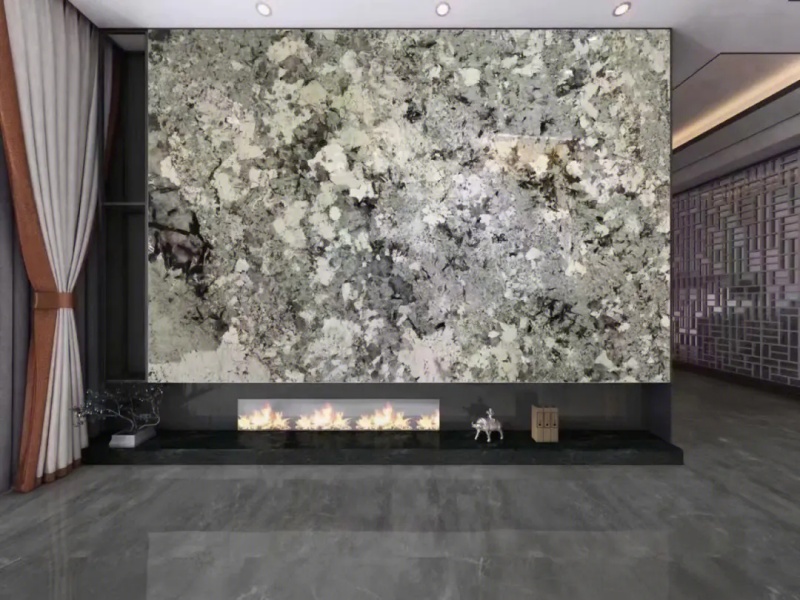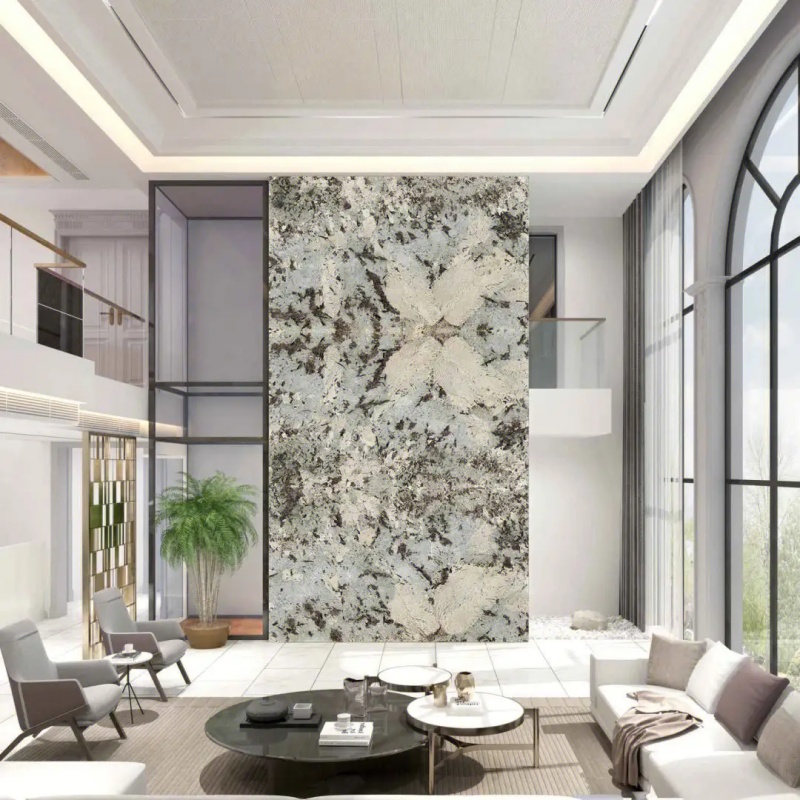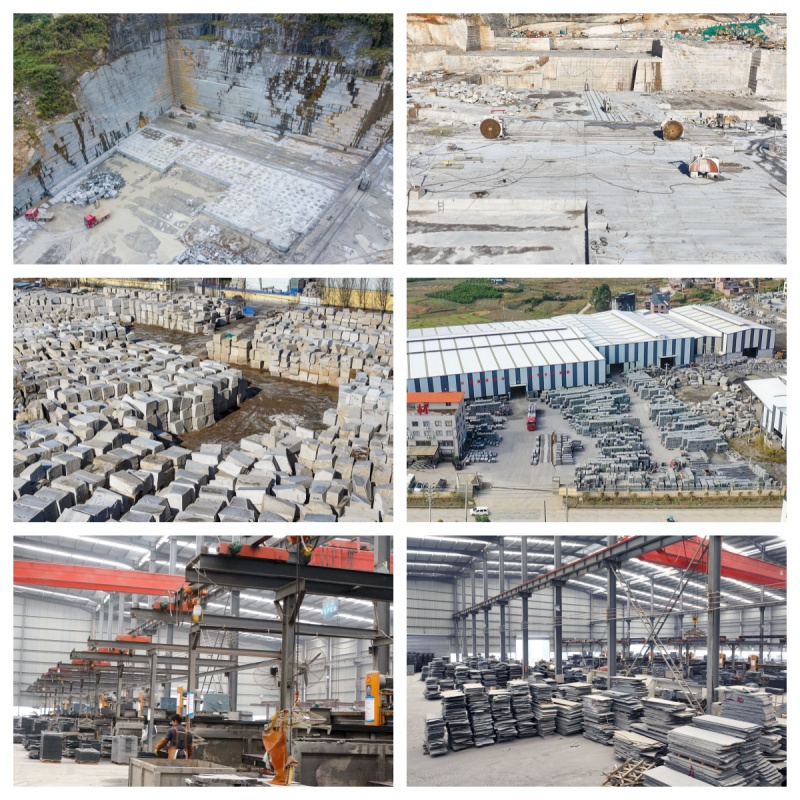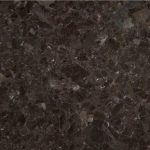Alpinus Granite is a popular natural stone that is durable and has a distinct appearance. It is used in both residential and commercial settings.
It is used in both residential and commercial settings.Residential and commercial projects looking for a mix of utility and visual appeal choose Alpinus Granite because of its durability, unique look, and adaptability in many design uses.
What is Alpinus Granite?
Alpinus Granite, sometimes just Alpinus, is a kind of natural stone distinguished by beauty and durability. These are some salient characteristics and specifics regarding Alpinus Granite:
- Color and Texture: It usually has a white to grey backdrop with varied black, grey, and occasionally beige or brown speckles. The stone gains a textured and dynamic appearance from the speckled or mottled pattern these mineral deposits generate all around it.
- Origin: It is readily available and of quality from quarries mostly in Brazil. Because of its geological formations, Brazil is well-known for generating a great variety of granite types.
- Composition and Formation:Like all granites, Alpinus Granite is an igneous rock produced from slow crystallisation of molten magma under Earth’s surface. Mostly consisting of quartz and feldspar, it also contains various levels of mica and amphibole among other minerals.
- Durability: it is quite resistant to stains, heat, and scratches as well as highly durable. This qualifies it for countertops, floors, wall cladding, and more both indoors and outside.
Is Alpinus Granite Pricey?

Its price could change depending on numerous elements like quality, provenance, availability, and market demand. In the field of natural stones, granite is usually regarded as a mid-range to high-end material.
Why is Alpinus Granite so Pricey?

- Scarcity and Rarity: hough Alpinus Granite is mostly found in Brazil, changes in colour, pattern, and quality might influence its availability. Alpinus Granite’s rarer or less abundant certain patterns or grades could affect their price depending on restricted supply.
- Quality and Appearance: Higher-quality Alpinus Granite with consistent colouring, little veining, and less natural flaws usually commands a higher price. Because they seem better, stones with more desired patterns or colours are frequently more expensive.
- Extraction and Transportation: The process of quarrying granite involves significant labor and equipment costs. Transporting the stone from quarries to distribution centers and ultimately to the customer’s location can add to the overall cost, especially if the quarry is located far from urban centers or shipping ports.
- Processing and Finishing: Granite slabs are first mined then processed to produce desired finishes such polished, honed, or leathered. Along with quality control techniques to guarantee uniformity, the expense of these finishing operations contributes to the ultimate price.
- Durability and Longevity: Granite’s long-term worth stems from its recognized durability, hardness, and wear and tear resistance. The lifetime and low maintenance demands over time of premium granite, such as it, help to justify the initial outlay.
- Market Demand:Alpinus Granite’s price may vary according on changes in market need. High demand for a given color or design could cause suppliers to change prices to reflect market dynamics and guarantee supply meets demand.
- Installation Costs: Alpinus Granite’s total cost includes installation costs, which vary depending on the intricacy of the project, locati0n, and installer’s degree of experience. These expenses help to define the material’s general apparent cost.
Where in the World is Alpinus Granite?
Mostly, it is mined in Brazil. Rich geological formations in Brazil are well-known for generating a range of granite forms, including Alpinus Granite. Specific areas within Brazil notable for granite quarries are Espírito Santo, Bahia, Minas Gerais, and Ceará.
Why Is Alpinus Granite So Popular?
- Aesthetic Appeal: Alpinus Granite usually has an arresting mix of black, gray, and occasionally beige or brown speckles against a white to gray backdrop. Its natural and aesthetically pleasing appearance from this unusual patterning and color variety can accentuate the charm of any environment.
- Durability:Alpinus Granite, is quite resilient against stains, heat, and scratches as well as In heavy traffic areas including kitchens, baths, and flooring in both homes and businesses, this durability makes it perfect.
- Versatility: Alpinus Granite is flexible and finds use in a great spectrum of projects. Its ability to resist different weather conditions makes it popular for kitchen counters, bathroom vanity tops, flooring, wall cladding, backsplashes, even outdoor paving.
- Longevity: Granite is known for its longevity and ability to retain its appearance over time with proper care and maintenance. This durability factor adds to its value and makes it a preferred choice for applications where longevity is a consideration.
- Natural Beauty: Granite is well-known for its lifetime and capacity to keep its look over time with appropriate upkeep. This durability element contributes to its worth and influences its preferred choice for uses where longevity is a factor.
- Status and Prestige: It is a natural stone with special variances in color, pattern, and veining not possible with synthetic materials. Every Alpinus Granite slab is unique, lending every area some natural beauty and uniqueness.
- Availability:Brazil, where Alpinus Granite is mostly mined, boasts a strong granite sector and exports granite extensively all around. This availability guarantees Alpinus Granite’s consistent supply to satisfy world demand, which helps to explain its appeal.
what is the application of Alpinus Granite?
- Countertops: Its resistance to stains, heat, and scratches as well as durability make it a common choice for bathroom vanity tops and kitchen counters. Kitchen and bathroom surfaces benefit naturally and aesthetically from its speckled or mottled appearance.
- Flooring: Residential and business environments would find it appropriate for flooring. Its robustness qualifies it to survive significant foot traffic, so it is perfect for kitchens, hallways, doors, and other places where durability is given first importance.
- Wall Cladding: Providing a textured and decorative feature, it can be used to cover walls in bathrooms, showers, and other inside areas. In living rooms or accent walls, Alpinus Granite provides visual appeal and can establish a focal point.
- Backsplashes:It is a common backplash material in bathrooms and kitchens. Its easy maintenance and robust character make it a sensible option for covering walls from splashes and spills, therefore improving the visual attractiveness of the room.
- Outdoor Paving: Its resilience to weathering makes it ideal for outdoor uses such pool surrounds, pathways and patios’ paving stones. It gives outdoor living areas a refined and natural appeal.
- Decorative Features:Custom furniture pieces, tabletops, fireplace surrounds, shelves, and offcuts of it can all be used as ornamental accents using smaller pieces. Its durability and natural beauty fit well for making striking items in interior design.
- Commercial Applications: Commercial environments including hotels, restaurants, and office buildings employ it for floors, counters, and wall cladding. Its robustness and beauty help to produce a professional and upscale environment.
It’s price range reflects elements of quality, provenance, availability, market demand, processing, and installation needs. These elements should be taken into account by prospective users of it while assessing the expenses of running their projects.















